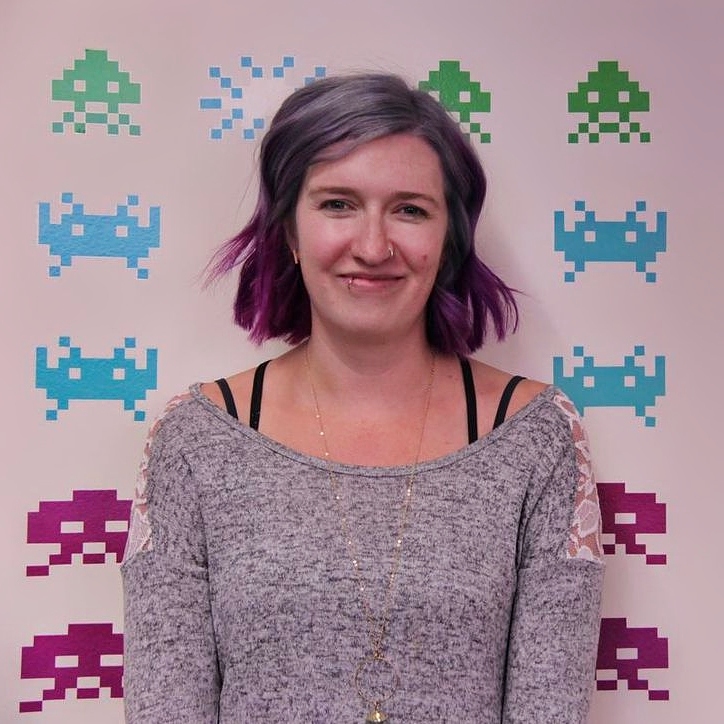A growing number of fresh recruits to the gaming industry leave within the first three years, and University of Alberta researchers aim to find out why.
“There’s this huge explosion in post-secondary gaming programs and the number of people pursuing it as a career, but for most people it will be very short-lived,” says Kenzie Gordon, a doctoral candidate in digital humanities and modern languages and cultural studies.
“And we know that for people of colour, women and marginalized gender folks, it's even shorter. But there's not really any research on why.”
Through a project called The First Three Years, Gordon and her research collaborators hope to identify changes in gaming programs and in the gaming industry that might help new grads succeed. The U of A offers a certificate in computer game development jointly between the Faculty of Arts and the Faculty of Science.
With partners from York University, the University of Waterloo and Western University, Gordon and her supervisor, Sean Gouglas, have launched a three-year study to explore barriers to success in the gaming industry for new recruits.
They have so far interviewed or surveyed more than 200 people in the United States and Canada in the final year of a gaming program, and in their first year of employment after graduation.
Thirty-nine per cent identified as 2SLGBTQ+, and 31 per cent as having a physical or mental difference. Almost 20 per cent felt that “an aspect of their identity negatively impacted their experience in the game industry,” says Gordon.
New employees range from those working in large triple-A gaming studios to those who have started their own companies, to some even working at NASA. “The range of places they've gone is really incredible. But there's also a substantial portion who have applied for over 100 jobs and end up with nothing.”
Last spring, Gordon and research collaborator Cristina Amaya — founder and president of Latinx in Gaming and former vice-chair of the International Game Developers Association — presented some of their initial findings at the Games Developers Conference in San Francisco.
Common complaints from study participants point to unrealistic “crunch” workloads in school programs, experience shortages, lack of career counselling and insufficient portfolio pieces from coursework. They also cited a lack of diverse faculty and poor awareness of systemic discrimination.
“Pretty much every participant in our study said they loved games as a kid and wanted to pursue them as a career,” says Gordon. “In university programs they find that making games is not the same as playing games, so there is a fairly high attrition rate. As many as 40 per cent of gaming students are not making it to the end of their degrees.”
Many post-secondary programs prepare students for the industry by putting them through a “crunch” development cycle with tight deadlines, she says, “so they're burned out before they even get to the industry.”
“We know that a lot of students crunch for basically the majority of their game education,” she told her audience at the conference. Then they are willing to take any gaming job they can get into. “They don't really have a lot of capacity to make workplace choices that are going to be a healthy work environment for them.”
Only about half of the study’s participants were employed by a game industry or related tech field a year after graduation. Those lucky enough to secure an internship either during or just after graduating tended to fare better.
“Internships make a really big difference, but the number of them available is often much smaller than the number of students in programs,” says Gordon. “The folks who don't have internships are much more likely to be kind of floating or in a non-game field.”
Many working for triple-A studios are discouraged by a lack of creative autonomy, especially if they graduated from schools allowing them a degree of free rein. “You get dropped into a 500-person team and your job might be to put trees in the right place or something.”
While there is a strong subculture of those who identify as 2SLGBTQ+ or as racialized in gaming, many find it difficult to adjust to the industry workplace, often assuming it will be toxic when they see no obvious attempts to prevent discrimination.
“As I start to go into the game industry as a queer, black woman, I know that there are a lot of struggles and adversity that I will face,” said one study participant. “That alone can kill my motivation sometimes.”
Gordon recommends that both school programs and gaming studios need to have more intentional conversations about harassment and discrimination in game education and the workplace.
Participants who reported being happiest were those employed in either small, independent studios or a “games-adjacent sphere” not affected by the intense game development cycle, says Gordon. “They're getting to do stuff with their skills but not working 70 hours a week.”
She cited one recent graduate who works for an interactive art-installation company that draws on their animation and programming skills to create displays.
“They get to be creative, are part of a medium to small team and only work 40 hours a week with a reasonable work-life balance.”
But if employed by a triple-A studio, new employees are “starting at the bottom and they're going to be grinding,” she says.
“Maybe we'll find they're happier at the end of the three years. But at this point, if you're on that track you’re likely in the weeds.”
Gordon’s research group plans to disseminate its findings through academic publications and by submitting a report with recommendations to the Higher Education Video Game Alliance — a non-profit organization dedicated to improving gaming education — and the Entertainment Software Association.

